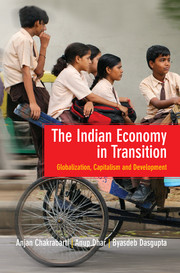Book contents
- Frontmatter
- Contents
- Preface
- Introduction
- Chapter I The Condition of the Working Class in Contemporary India
- Chapter II Capitalism: The ‘Delusive Appearance of Things’
- Chapter III Post-colonial Development and ‘The Thought of the Outside’
- Chapter IV The Word and the World of Neo-liberalism
- Chapter V The Scrypt of Transition: Between the Spectral and the Secret Thereof
- Chapter VI From Self-reliance to Neo-liberalism: The Political Economy of ‘Reform’ (1991–2014)
- Chapter VII Global Capitalism and World of the Third: The Emergent Cartography of the Indian Economy
- Chapter VIII Inclusive Development, State and Violence
- Chapter IX From Economic Crisis to Transition Crisis
- Conclusion
- Bibliography
- Author Index
- Subject Index
Introduction
Published online by Cambridge University Press: 18 December 2015
- Frontmatter
- Contents
- Preface
- Introduction
- Chapter I The Condition of the Working Class in Contemporary India
- Chapter II Capitalism: The ‘Delusive Appearance of Things’
- Chapter III Post-colonial Development and ‘The Thought of the Outside’
- Chapter IV The Word and the World of Neo-liberalism
- Chapter V The Scrypt of Transition: Between the Spectral and the Secret Thereof
- Chapter VI From Self-reliance to Neo-liberalism: The Political Economy of ‘Reform’ (1991–2014)
- Chapter VII Global Capitalism and World of the Third: The Emergent Cartography of the Indian Economy
- Chapter VIII Inclusive Development, State and Violence
- Chapter IX From Economic Crisis to Transition Crisis
- Conclusion
- Bibliography
- Author Index
- Subject Index
Summary
To understand Benjamin properly one must feel behind his every sentence the conversion of extreme agitation to something static, indeed, the static notion of movement itself.
Theodor Adorno, Gesammelte Schriften I: xix,Suhrkamp VerlagThis work is on India's economic transition. In that sense, this work is as much about ‘India’, as it is about ‘economic transition’. It is as much about an emergent India, as it is about an extant and an imminent economic transition. It is as much about the idea of India, as it is about the idea of (economic) transition. This work is also about the ‘static’, as it is about what could be called ‘movement’. It is about what is static in what is seen as movement, as it is about micro-movements in what is seen as static. It is about the overdetermined and contradictory relationship between staticity and movement in India's economic transition, or for that matter, any transition.
This however is not the first work on transition. The contemporary is a season for popular paperback on India, on the idea of India, and especially on India's post-reform, post-globalization, transition, even more on the path(s) ahead. Jagdish Bhagwati and Arvind Panagariya (2013), Jean Dreze and Amartya Sen (2013) and Aseem Shrivastava and Ashish Kothari (2012) are three that immediately come to mind. Taking the risk of a mild smoothening of their respective positions, one can say that the first represents a defence of the classical growth-induced path of progress, the second once again intends to capture the essence of progress, but from the functionings-capabilities approach, and the third a post-developmentalist critique of progress.
This work, like the three mentioned above, is also on India's post-reform transition. However, this work is not just a re-description of post-reform transition from one's own perspective/standpoint. It is also premised on the question: what is transition? What do we mean by transition? What is our understanding of transition? What qualifies as an experience of transition? When and in which context do we say, this is indeed transition? This work, thus, engages with the concept of transition. It relates the somewhat abstract conception of transition to the concrete-real: India's economic transition. Or perhaps its understanding of India's economic transition helps it to make sense of the abstract concept of transition.
- Type
- Chapter
- Information
- The Indian Economy in TransitionGlobalization, Capitalism and Development, pp. ix - xxPublisher: Cambridge University PressPrint publication year: 2015



